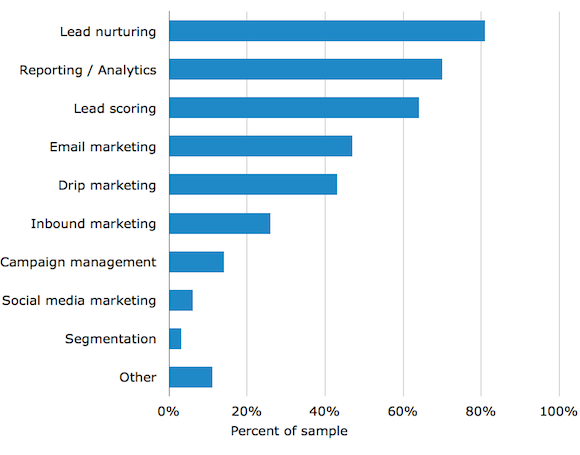
2014; the year of marketing automation?
Marketing automation is expected to boom this year. 26% of all marketers are investing in marketing automation software, increasing total adoption to nearly 66% in total at the end of 2014.
According to a recent study that covered 896 marketers, the majority of buyers (91%) are evaluating marketing automation software for the first time, with 48% of buyers currently managing marketing activities with CRM software. As CRM software traditionally lacks sophisticated outbound marketing features, it is logical that marketers are moving towards marketing automation software more.
Marketing automation has reached SMB’s as well, with 50% of buyers having fewer than 50 employees in their company (15% had 500 or more).
What about you? Are you ready yet to start automating your marketing? This article combines the most recent market studies and hands-on tips to point out some uses of marketing automation.
Uses of marketing automation
Marketing automation revolves around the idea that a marketer should be marketing a brand instead of focusing on operations and repetitive tasks only.
Because of the rich data from various sources, nowadays marketers are able to automate complete customer journeys, from the first interaction on social media, up until the point of retaining an inactive (and possibly a non-engaged) customer.
A study from Software Advice has pointed out that this year most marketers are looking for lead nurturing (81%) and lead scoring (64%) [infographic] features in their marketing automation strategy.

Currently, most marketers are seeking to increase conversions from newly acquired customers instead of increasing customer values. This conclusion is backed up by data from the report from Holger Schulze’s Linkedin group of B2B technology marketing, that adds that 53% of B2B marketers are actively using marketing automation and another 17% are evaluating or considering marketing automation. Of the companies that use marketing automation, 75% have been doing so since 1 or 2 years.
For a marketer, the loyalty and retention will be probably the next phases to automate in the customer journey. Asked for his opinion about this, Software Advice’s Derek Singleton responds:
"Of course, there are many use cases in which a company could use their marketing automation system to improve customer retention and loyalty. Much of the email branching and nurturing logic in a marketing automation system can be applied to current customers to offer new products and services to existing customers or to opt customers into a loyalty program."
For example: a web shop customer has left products in his shopping bag, but has not completed the order yet. You can follow-up with an email containing exactly the products that the customer has in its bag. When a new customer registers, you could hand-out an e-coupon containing a personalized bar code that the customer can scan at the cash register in the shop. And inactive customers can be retained by offering incentives.
Manchester United used marketing automation throughout the whole customer journey. As a result, the football club saw a dramatic decrease in work load for their customer care department, a 200% increase in conversion rates and 85% increase in revenues from mobile devices when it implemented marketing automation for its Soccer Schools program.
